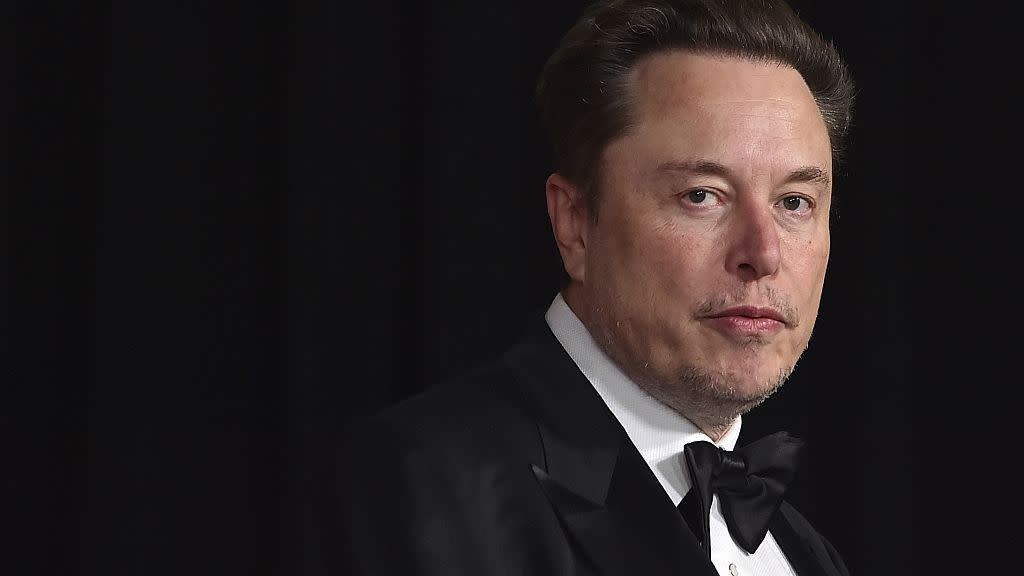Life on Mars, ‘honest’ AI, and a job-free future: Elon Musk opens up at VivaTech Q&A

“I think we will have the first people on Mars probably within 10 years, maybe seven to eight,” Elon Musk told the VivaTech fair in Paris on Thursday, adding that humans would be back on the Moon in five years.
In a session called ‘Everything you always wanted to know about Elon Musk but were afraid to ask,’ based on the title of a Woody Allen film, the tech-enthusiastic audience got to grill Musk on anything they wanted.
“SpaceX’s long-term goal is to make life multi-planetary,” he said.
“We need to become a sustainable multi-planet civilisation. This is the first time in the history of the Earth when it is possible to do so. That capability might be only open for the short term,” he added.
He was speaking remotely at the Paris event as he said he was attending his son’s graduation and could therefore not be there in person.
NASA signed a nearly $3 billion (€2.7 million) contract with SpaceX to use its new Starship mega-rocket as the lunar lander in its mission to return humans to the Moon with its Artemis astronauts.
But this has not yet happened and is supposed to later this year.
He also said his SpaceX company and others like it that have partly reusable spacecraft and rockets, are the ones that will accomplish this mission, unlike Europe’s Ariane rockets.
“Any rocket that is not, or mostly not reused will not survive,” he said, explaining that it is not cost-effective for a company.
“Eventually, something on Earth will eliminate life as we know it on Earth,” he later said, adding that a move to Mars and the Moon is necessary for “[our] long-term survival and consciousness”.
Asked if aliens are on Earth, he said: “People often ask me do I think aliens are on Earth, I have not seen any evidence of aliens. If I did, I would post it [the evidence] on the X platform,” he said, referring to his social media platform.
“Maybe we’re alone in this galaxy, maybe it’s just us and our consciousness is extremely fragile,” he added but later joked, “I am an alien. But nobody believes me”.
Honesty is the best policy AI
The South African billionaire was also asked about artificial intelligence (AI) and his company XAI.
Criticising OpenAI and Google’s Gemini he said: “It's important that AI is trained to be truthful and not to be politically correct”.
“Political correctness is often simply not true, and that means you're programming AI to lie, and I think that will backfire very badly. Honesty is the best policy," he said referencing Gemini.
Comparing making AI smarter to raising a child he said: “It matters what you do… raising it with values. I’m concerned with Microsoft values, or OpenAI, Google”.
OpenAI hits back at Elon Musk’s lawsuit and says he wanted full control of ChatGPT maker
Elon Musk's X sheds the last of its Twitter branding by changing web address to x.com
Musk’s GrokAI chatbot, which he claims is open source, will “try its best to be rigorous and pursue the truth and be the funniest. If we are going to die, we might as well die laughing”.
But he admitted it still had “a lot of catching up” to do before it could compete with OpenAI or Gemini, which he said could be possible by the end of the year.
He also discussed how AI could transform education and said parents would still need to be responsible for values and morals. However, AI could help tailor lessons, he said, so that each child could have Albert Einstein as a teacher.
He was not concerned about AI’s effect on children but said he was worried about social media, despite owning his own social media company since 2022, which has been criticised as a place of disinformation and rampant hate speech.
“I do worry kids these days are trained by social media, which are dopamine maximisers. I’d urge parents to limit social media to children because they are being programmed”.
A job-free future
As for the question as to whether if AI would take our jobs, Musk said he envisioned a future where people would not work.
“In a benign scenario, probably none of us will have a job,” he said, adding that there would be a universal high income and people would not be lacking goods or services. But the question for people would be finding meaning.
Audience members’ questions turned existential, with one asking if he could time travel, what would he tell his younger self?
He said he felt “classic time travel problem,” which is would life be altered for the worst and change the outcome.
“Overall I’m happy with how things turned out – I probably wouldn’t do anything. You don’t know if it comes out with a worse outcome,” he said.
“I’d be curious to see a younger me, but I’d probably stay invisible and not say anything”.
However, keeping quiet might be as much a challenge for a time-travelling Musk as the real Musk.

 Yahoo News
Yahoo News 
